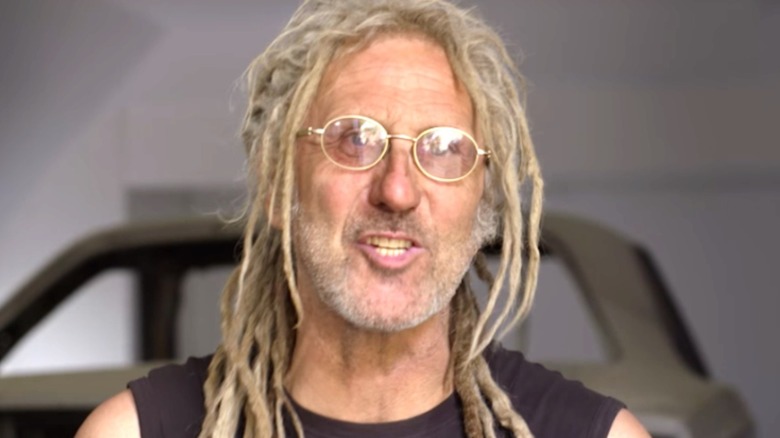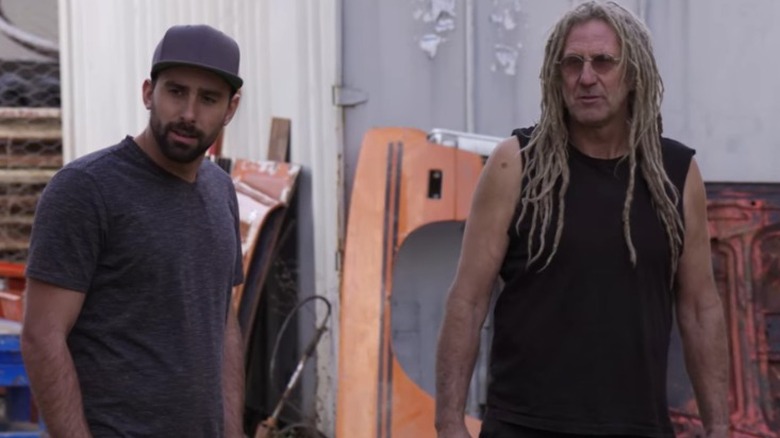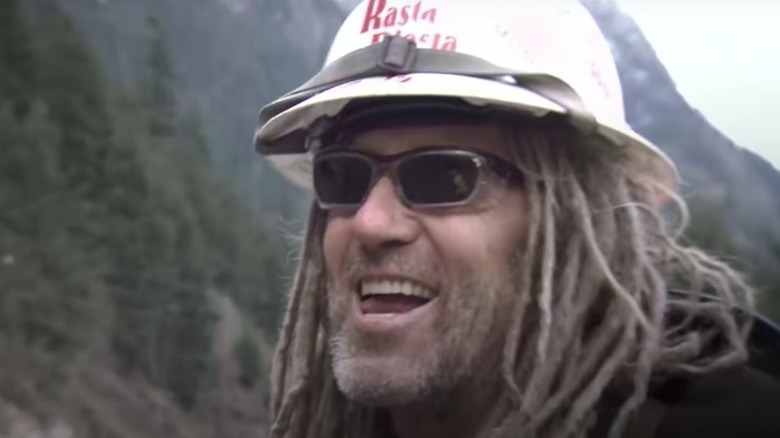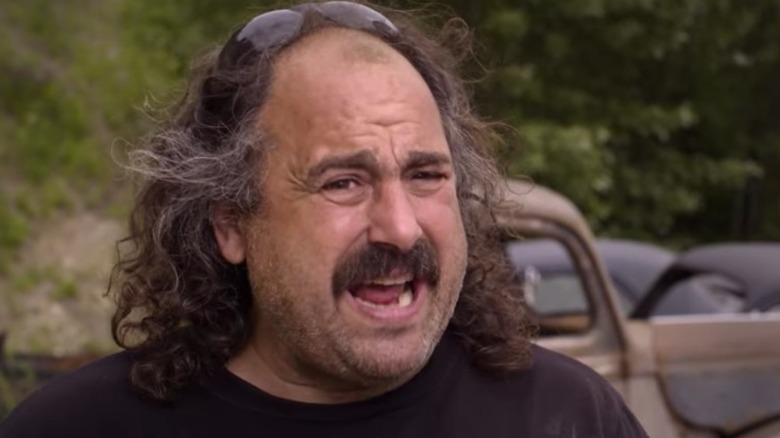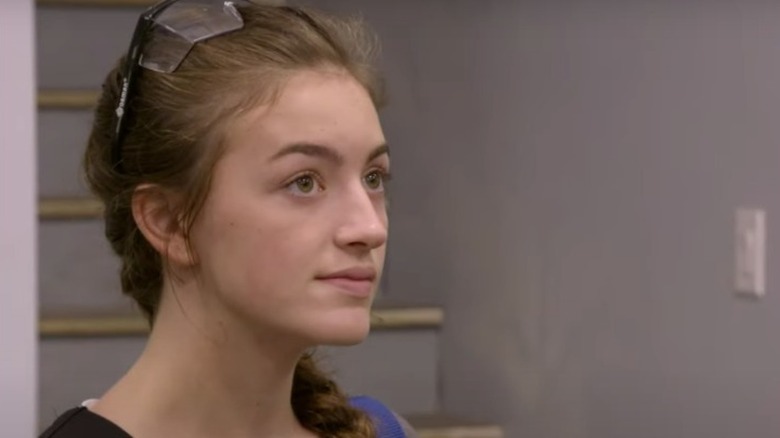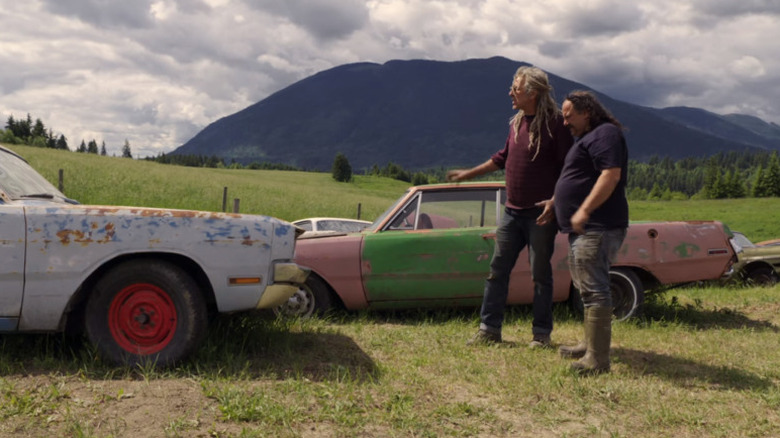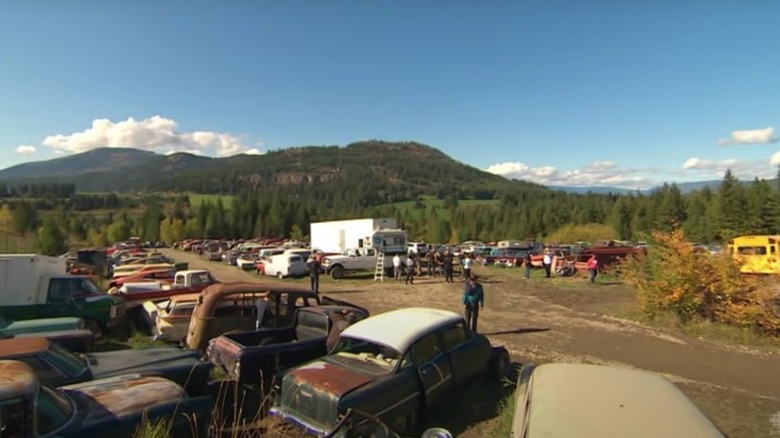The Untold Truth Of Rust Valley Restorers
Like so many surprisingly compelling occupational reality TV series (we're lookin' at you, "American Pickers"), "Rust Valley Restorers" succeeds, in large part, thanks to the unique collection of personalities around which the day-to-day events revolve. In the case of the Canadian-based car restoration show, those personalities include instantly recognizable auto shop owner Mike Hall, his business-minded son, Connor Hall, his go-to mechanic, Avery Shoaf (aka, the "muscle car MacGyver"), and young auto body apprentice Cassidy McEown.
The show follows the rag-tag team of gearheads and car enthusiasts as they navigate the business of antique car restoration and work to appease a litany of fascinating clients through Hall's company, Rust Bros Restorations. Created by Matthew Shewchuk and Tyson Hepburn and originally aired on the History Channel, the show was eventually picked up by Netflix, and its first three seasons are currently available on the streaming service. The series' takes its name from its subject's unique location — Tappen, British Columbia — known colloquially as "rust valley" thanks to the seemingly endless fields of old, dilapidated, rusting cars that characterize the landscape (via Hot Cars). It's a simple formula and premise, but like any series involving real people and industry, a quick look under the hood reveals there's more to the story than the compact episodes suggest.
Mike Hall may be slighty more business savvy than the series suggests
As any self-respecting fan of reality TV knows, a large part of a series' overarching narrative comes from a scripted simplification of its featured "character" dynamics. This is as true for "Rust Valley Restorers" as it is for, say, "Keeping Up With The Kardashians," despite the far more apparent use of the technique in the latter. In the car-based History series, the Rust Bros Restorations owner is often depicted as having little skill when it comes to focusing on turning a profit, while his son Connor is portrayed as forever attempting to get his father to think about the bottom line. While Hall's blind love for car collection and restoration does indeed lead him to make some less than financially sound decisions, his entrepreneurial history suggests he's no amateur when it comes to running a business.
The majority of Hall's money — which, as the series reveals, he puts mostly into his cars and restoration business — came from his work in what's often vaguely alluded to as "construction." As it turns out, Hall owned his own business in the Slope Stabilization industry called Chimera Springs Rock Works (via Hot Cars). Known as the "Rasta Blasta" due to his infamous dreadlocks, Hall and his company scaled unstable roadside cliffs and set off explosives to control their unpredictable and dangerous erosion. According to Hot Cars' Cory Barclay, the "Rust Valley Restorers" star, as of December 2021, had managed to rake in about five million dollars, "mostly from construction while the rest of the equity is in the cars and property he owns."
Rust Valley Restorers isn't Hall's first reality TV appearance
Despite his success, there's quite a bit of truth to the narrative that Hall puts his love for cars over his love for money, and the road to reality TV stardom was filled with potholes. As Hall told Driving Canada in 2019, his car restoration business got off to a rocky start: "My accountant told me I lost a lot of money," he told the outlet, explaining that the previous year, he'd "only broken even on two cars." Luckily, Hall's endearing personality and local celebrity during his time as the Rasta Blasta had created an opportunity for the struggling businessman.
In 2017, prior to landing his own show, Hall appeared in a series called "Highway Thru Hell" on Canada's Discovery Channel (via IMDb). The series followed a Canadian towing a recovery team as the came to the rescue of felled vehicles on some of the most dangerous and difficult roads in Hope, British Columbia, and Hall's memorable appearance in Season 6, Episode 10 ("Junior's Job") brought him to the attention of both television audiences and TV producers (via YouTube).
After a news story about Hall's (first) ambitious attempt to sell his property and collection of cars went viral, Mayhem Entertainment asked if he'd be interested in his own series about car restoration. Since Hall was a collector not a restorer, he was initially hesitant, but after putting together a team and funding over three days, he ultimately agreed to take the plunge (via Castanet Kamloops).
Like Hall, Avery Shoaf owned his own business prior to the show
An integral member of that team, mechanic and series star Avery Shoaf took a similarly unconventional path to reality TV fame. Yjr quirky car enthusiast signed on to the series after his heavy equipment rebuilding company, Tappen Business, failed, and a 2018 attempt to put together his own car restoration shop proved fruitless. Though Shoaf has intentionally (and, in a rare turn of events, successfully) kept the majority of his personal life and history out of the public eye, there are a few things we know. For instance, although the notoriously mysterious mechanic is tight-lipped about his romantic life, he doesn't shy away from posting pictures of his son Shafin (whose name was eventually garnered from comments on social media, as opposed to from Shoaf himself, as The Cinemaholic reports) on his widely-followed Instagram, which boasts over 140k followers. Fans of the series also know that Hall's son Connor, a former employee of Shoaf, views the larger-than-life personality as a kind of mentor. Finally, we know that, as of 2020, Hall's cohort in car restoration (as reported by Hot Cars) had an estimated net worth of around $200k.
His intriguing and hard-to-come by real-life narrative notwithstanding, Shoaf is just a part of what makes "Rust Valley Restorers" so appealing to television audiences. One of the series' other recurring characters quickly developed a following all her own.
Former apprentice Cassidy McEown was brought up in the industry
Unlike other series of its kind, such as (for instance) "American Chopper," the Canadian spin on the genre features a number of women. One of those women, Auto Body Apprentice Cassidy McEown, has been a major player in several "Rust Valley Restorers" episodes, and her Instagram following rivals that of any of her co-stars. Though she may be an apprentice at the start of the series (she's since earned her Red Seal), McEown is by no means new to the business of collecting, appreciating, and rejuvenating car cadavers. As she reveals in a History Channel interview, McEown's entire family is "into cars," both her mother and father are mechanics, and she's had a love of cars "brainwashed into (her)" from a young age. Despite not having a choice in the matter, McEown's passion for the trade is both real and visible to viewers.
As of 2021, the North Carolina native and Okanagan College Auto Collision Repair major had an estimated net worth of $1.2 million (via FanBuzz), but that hasn't prevented her from taking her work seriously. In a recent Q & A with Okanagan College Trades & Apprenticeship, McEown spoke passionately about the benefit of entering into a trade, the importance of the collision trade itself, and the creativity that goes into a repair approach. Despite her love for the job, McEown was honest about what it's like to be a woman in a largely male-dominated industry. "You always have to ... work a little extra harder," she said, adding that constantly having to prove herself "puts the fire under (her)" to do exactly that. Her appreciation for — and knowledge of — all things auto makes her every bit as qualified as anyone else on the series.
Rust Bros Restorations helped Habitat for Humanity begin an annual tradition
Chalk it up to good 'ol fashioned Canadian kindness, but the folks at Rust Bros Restorations aren't just in it for the money (often to a degree that makes Connor nervous). In 2019, they helped Habitat for Humanity in Kamloops, Canada begin a brand new fundraising tradition. As the Salmon Arm Observer reported at the time, the team donated a prized, classic car with a value of nearly $70k to the housing-oriented non-profit, who featured the car in a fundraising raffle.
At the charity's Jingle Bell Rock Dinner & Dance in December of that year, raffle participant Louise Dagg took home the restored 1968 Camaro SS Convertible, kicking-off what would become an annual event for Kamloops' Habitat for Humanity. The following year, the organization raffled off a 1968 Beaumont Convertible, and in 2021, they raised funds with the help of a 1969 Barracuda Convertible (via HFH Kamloops).
The Rust Bros Restorations' generous donation helped the charity in its goal to build "70-plus homes in various locations for 2020," as executive director Bill Miller told CFJC Today, and gave the local non-profit an idea for a tradition that it's continued ever since. Currently, the Kamloops Habitat for Humanity is raffling off a 1979 Harley Davidson, charging just $10 for a chance to take home the bike while helping to "build affordable housing for seniors, veterans and families" throughout the area (via HFH).
The Majority of Mike Hall's car collection was auctioned off in 2021
Hall may be generous, but that hardly means it was easy for him to part with the massive collection of antique cars (over 500 of them) that he auctioned off in October of 2021. In an interview with the CBC, Hall said he'd had many of the cars on his lot "for 30 or 40 years," but that it was "time for somebody else to take care of them." After selling his property in Tappen earlier that year, the car lover made the difficult decision to part with the majority of his collection. "I'm going to leave my family enough problems," he told the outlet, adding "this is one that I think I should kind of tidy up while I'm still here."
As Hall has said many times, he never actually viewed himself as the cars' owner, but as their temporary caretaker (via CBC YouTube). "If they go to good homes and somebody does something with them, then I've done my job," he explained in a widely publicized interview (via Motorious). Of course, walking away from the carefully curated remnants of a lifelong passion isn't easy. In the end, the TV personality ended up holding on to "just" 52 cars. "I still have a full deck to play with, just don't have a full deck up here," he joked, pointing to his head (via CBC YouTube).
Though a fifth season has yet to be announced, it's safe to say Hall will have little trouble rebuilding his collection (if he feels the need) given the show's increasing success (via Parrot Analytics) and Hall's ever-growing celebrity.
